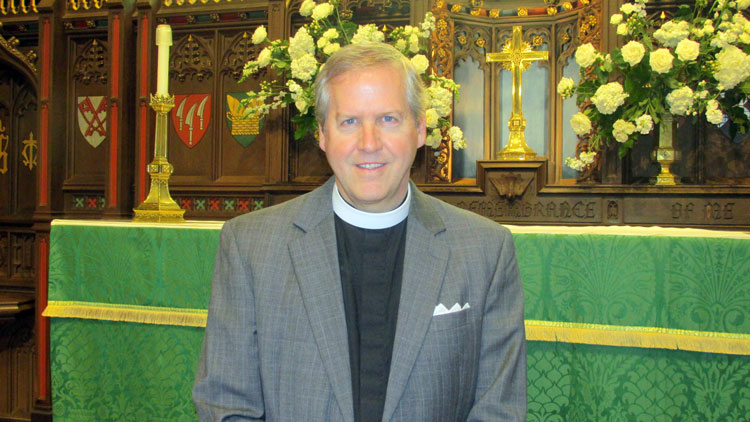
By Marek P. Zabriskie
In today’s 24-hour news cycle, Mark Twain’s observation that “a lie can get around the world before the truth can get its pants on” has never been more true.
The great Presbyterian preacher, George Buttrick, wisely wrote: “The search for truth is the purpose of the journey of life. God safeguards our freedom. God gives the sign but it is up to us to make the journey on up. The journey is always against common sense; practical people condemn it and later live by borrowing its courage. The journey is always blocked both by nature’s barriers and by the Herod’s systems of the world but it leads to life for all who make the journey.”
In John’s Gospel, Jesus says, “I am the way, and the truth and the life.” (John 14:6) Later, as he stood before his accusers and Pontius Pilate, Jesus said, “For this I was born, and for this I came into the world, to testify to the truth. Everyone who belongs to the truth listens to my voice.” (John 18:37). Pilate asked him, “What is truth?”
Truth is everything. If a person cannot be trusted, if he or she persists in telling lies, those around them are in danger. Being tethered to the truth is vital.
Today, we are witnesses to a war being waged on the truth. Can there be such a thing as truth anymore? Does it even matter? Or is all that matters: how is the economy? If a person says that climate change does not exist, does that make it so?
More than two out of three adults and more than four out of five teenagers argue that truth is always relative to the individual and the circumstances. While most Americans describe themselves as Christians and say that the Bible is accurate in its teachings, they nevertheless believe that truth is based on feelings, experience and emotion, according to a study by the Barna Group. If so, then the truth is in grave peril.
Alan Bloom, one of Yale’s most distinguished academicians, published his now famous book The Closing of the American Mind in 1987. In it he chronicles America’s drift towards relativism and away from the notion of absolute truth.
Bloom’s book attacks the emerging view at the time, especially among young people – now in their 50s, that truth is relative. The ancient Jews believed in many truths. The more accounts the better in our quest for truth; hence the reason for four gospels that each retell Jesus’ life with differing details. The Greeks, by contrast, preferred one, definitive or absolute truth.
As Americans, we possess a Greek mindset. We seek one truth. If several cars collide, each participant or witness will describe it differently. But someone must determine what actually occurred. What is the truth?
Some people do not think for themselves. They believe whatever their tribe, party, or leader claims to be true. There is little use in engaging them in an honest debate.
This becomes especially dangerous when lying is weaponized by leaders or when the press is portrayed as “the enemy of the people.” This is waging war on the Fourth Estate. Isn’t this what governments in Russia, China, Venezuela, and North Korea have done? Do we wish to emulate them? Discrediting the press which is committed to pursuing the truth paves the way for dictatorships and destroys democracy.
Likewise, transforming what was once known as “hard news” into opinionated viewpoints from either the left or the right is not helpful. It is not the truth, and it is not news. It is spin, which feeds our predetermined biases.
Our country needs to exercise common sense, to return to the center, and support the best ideas and yes, the truth.
As Americans, we want to trust our leaders. Trust, like truth, is crucial. Truth has authority. When the truth is seen, when it is spoken and lived, it has its own authority.
At Christ Church, we have a course called EfM or Education for Ministry. We study the Old and New Testament, church history and theology over four years. Participants offer critical incidents and are asked to select a biblical story to help interpret their personal stories theologically.
When reflecting on truth, trust, and the issues of our time, the story that comes to mind is found in II Samuel 12. It tells the story of how the prophet Nathan confronted King David after the king had committed adultery with Bathsheba and had her husband killed in battle.
Nathan tells the king a story about a rich man who had confiscated his impoverished neighbor’s only lamb to feed his dinner guests. The king explodes in anger, saying, “That man should die.” Nathan replies, “That man is you.” David repents, but it comes too late. His actions bring down his kingdom and cause the ruin of his family.
Henry David Thoreau notes, “It takes two people to speak the truth. One to speak it and one to hear it.” Are we seeking the truth? Do we demand it, or do we settle for something far less?
In his poem The Second Coming, the Irish poet W. B. Yeats wrote,
Things fall apart; the center cannot hold;
Mere anarchy is loosed upon the world,
The blood-dimmed tide is Loosed, and everywhere
The ceremony of innocence is drowned;
The best lack all conviction, while the worst
Are full of passionate intensity.
So far, the center is holding. Good people are acting with integrity. They are telling the truth and are refusing to carry out actions that would undermine the institutions that they serve. They bring years of experience, knowledge, and integrity to ensuring that our laws are followed. The same cannot be said of everyone.
As we bear witness to the war being waged on the truth, perhaps the best thing we can do is refuse to support those whom we know are not telling the truth. As Thomas Aquinas said, “You do not possess the truth; it is the truth that possesses you.”
The Rev. Marek P. Zabriskie, is the Rector of Christ Church.





